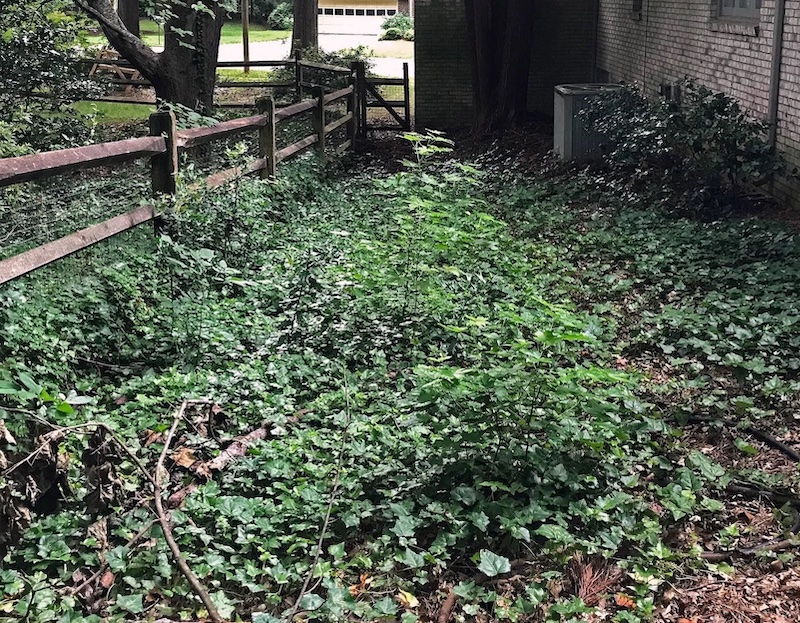Like red wine on a white shirt, invasive species can be difficult to remove — but with some hard work and patience, it is possible to clear them out.
One Redditor detailed their epic battle with English ivy in the r/DIY subreddit.
"Down with invasive species!" they wrote as if it were a war cry. "I'm methodically removing a 20-year-old infestation of English Ivy and holly from my parents' backyard."
The Redditor posted numerous photos of the battlefield before and after the grueling fight, and it's clear who came out victorious.
The before photos show a backyard almost completely covered in a blanket of invasive plants. The after photos show a clear area of dirt with pine needles, which they added to "prevent it from becoming a mud pit, and to start the process of forming a new layer of leaf-litter."
So how did our hero triumph over evil? While invasives like English ivy and kudzu can be targeted with herbicides, this Redditor was unwilling to engage in chemical warfare. "I'd like to keep things clean and cheap," they wrote.
This is a good thing because herbicides can result in a "significant loss of biodiversity," according to researchers at McGill University. The scientists found that the loss in biodiversity could impact how ecosystems adapt to new pollutants, which is concerning due to the increasing threat of pollution and climate change.
Furthermore, the American Cancer Society suggests certain herbicides may be linked to an increased risk of non-Hodgkin lymphoma. However, the EPA stated that the herbicide glyphosate is "unlikely to be a human carcinogen."
While the jury is still out on whether herbicides are safe for humans or not, a jury in Pennsylvania decided that one man's cancer was caused by the popular herbicide Roundup and ordered Monsanto and its parent company Bayer to pay $2.25 billion.
Since our anti-invasive species warrior smartly decided to avoid chemicals, they had to use pure grit and determination — and a multipurpose hoe/rake hand tool.
"The best way to remove the ivy (and to ensure it doesn't come back) is to excavate the root system," they explained. "Removing it requires a lot of painstaking digging, chopping, and pulling. It's fairly slow work if you do it thoroughly, but simple and repetitive."
"The results are so satisfying!" they wrote, admiring their victory. "Hopefully, it will become the long-term home for some shade-loving native species."
The battle had been won, but one commenter warned the OP that the war is not over: "Stay vigilant, it'll return." The OP knew the English ivy would not go quietly into the night and reassured the commenter: "I'll certainly be keeping a sharp eye on that fence…"
Another weary warrior looked to the OP for support, writing, "I have a hard battle with English Ivy. … This is the worst thing ever!" to which the OP replied, "Godspeed!"
Join our free newsletter for easy tips to save more, waste less, and help yourself while helping the planet.









